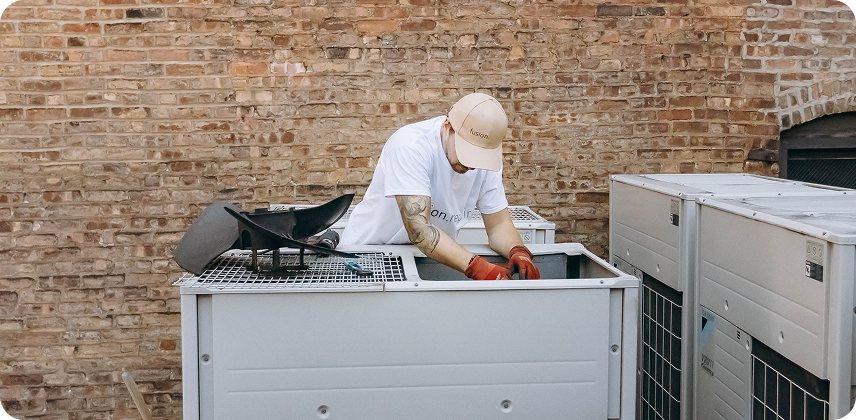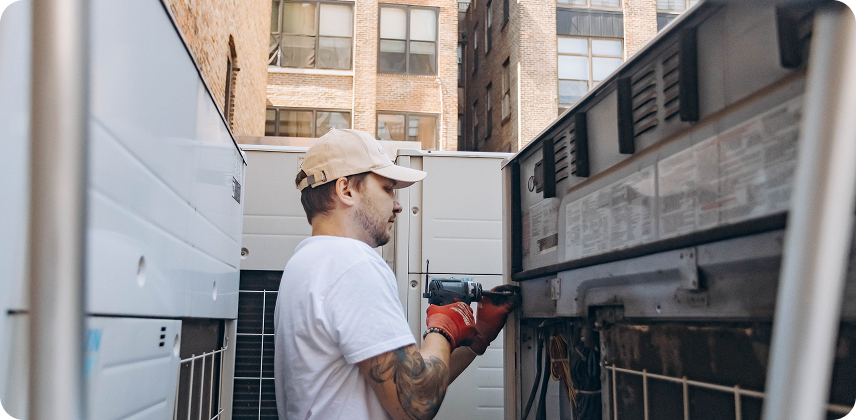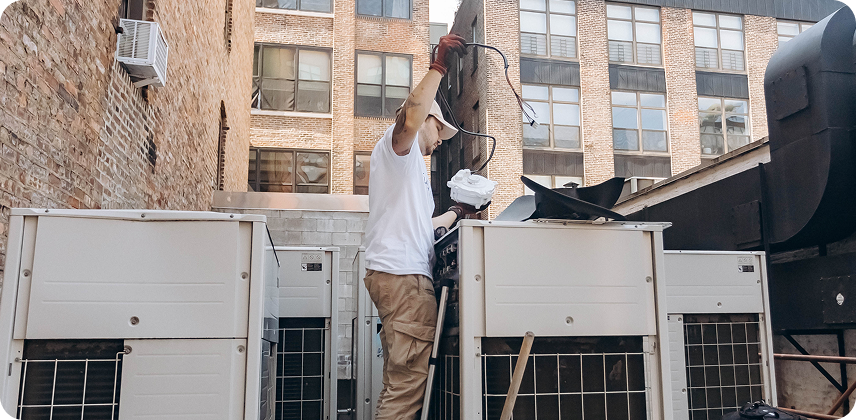How Does An HVAC System Work
We provide reliable commercial HVAC services to keep your heating and cooling system running efficiently. From HVAC maintenance to full system installations, our expert team ensures optimal performance for businesses and homes.
Top-rated NYC Repair Company
5/5
1500+ Reviews
4.8/5
100+ Reviews
4.8/5
1200+ Reviews
4.6/5
310+ Reviews
Table of Contents
- What Is an HVAC System?
- How Does an HVAC System Work
- Types of HVAC Systems
- HVAC System Components
- HVAC System Cost and Replacement Cost Estimates
- Residential HVAC Systems vs Commercial HVAC Systems
- Hiring an HVAC Technician for Repairs and Installation
- Emergency HVAC Repair Services
- Our HVAC Services Reviews
- FAQ
What Is an HVAC System?

HVAC filters play a crucial role in improving air quality, enhancing energy efficiency, and prolonging the lifespan of your HVAC system. A dirty HVAC filter can cause the system to work harder, leading to higher energy bills and potential damage to HVAC components. Routine HVAC maintenance, including timely filter changes, prevents airflow restrictions, reduces allergens, and ensures optimal performance. Ignoring HVAC repair and maintenance can lead to costly breakdowns and poor indoor air quality
How Does an HVAC System Work?
HVAC systems operate through a combination of heating, cooling, ventilation, and air distribution processes. Air is filtered, heated or cooled, and circulated throughout a space using various components
HVAC System Diagram and Airflow Process
An HVAC system diagram illustrates how air moves through ducts, filters, and vents. The HVAC duct system ensures even airflow distribution
Heating and Cooling in an HVAC System
Heating elements warm the air, while cooling mechanisms use refrigerants and compressors to regulate temperature. The HVAC unit maintains a comfortable indoor climate
Role of HVAC Thermostats and Control Systems
An HVAC thermostat manages temperature settings, while an HVAC control system automates airflow, humidity, and system performance
Types of HVAC Systems
There are various HVAC system types, each suited to different environments and needs-
Split System HVAC
A split system HVAC separates indoor and outdoor units for efficient heating and cooling
Mini-Split HVAC System
A mini split HVAC system is a ductless alternative, offering flexible zoning options
Central HVAC System
A central HVAC system provides consistent heating and cooling through a network of ducts
Portable HVAC System
A portable HVAC system is ideal for temporary or supplemental climate control
Hybrid HVAC
System
A hybrid HVAC system combines gas and electric power for energy efficiency
HVAC System Components
Each HVAC system comprises various components that ensure proper heating and cooling
-
HVAC Duct System and Air Distribution
Ducts and vents distribute air evenly, ensuring optimal temperature regulation
-
HVAC Equipment: Compressors, Coils, and Blowers
Key parts of an HVAC system include compressors for cooling, coils for heat exchange, and blowers for airflow
-
HVAC Chiller Systems and Cooling Mechanisms
HVAC chiller systems use refrigerants to absorb heat and provide cooling
Residential HVAC Systems
vs. Commercial HVAC Systems
Key Differences Between Residential and Commercial HVAC Systems: Size, Efficiency, and Maintenance Needs
| Factor | Residential HVAC System | Commercial HVAC System |
|---|---|---|
| Size | Smaller, designed for homes | Larger, suited for businesses |
| Efficiency | Optimized for small spaces | Handles high-demand environments |
| Maintenance | Less frequent service needed | Requires regular HVAC maintenance |
Hiring an HVAC Technician for Repairs and Installation

An HVAC technician is essential for proper system repairs, installations, and maintenance. Whether upgrading an old unit or troubleshooting issues, professional service ensures efficiency and longevity. If you experience HVAC failures, call for emergency HVAC repair to restore comfort and prevent further damage
Emergency HVAC Repair Services

A malfunctioning HVAC system can lead to severe discomfort and safety risks. Signs of an HVAC emergency include no heating or cooling, refrigerant leaks, electrical issues, or unusual noises. If your system suddenly stops working or shows signs of failure, contact an emergency HVAC repair service immediately to prevent further damage and restore comfort
Our HVAC Services Reviews
Our customers trust our HVAC services for reliable repairs, HVAC maintenance, and full system replacements. With years of experience, we provide top-rated service for residential and commercial HVAC systems
FAQ
What are the main components of an HVAC system?
An HVAC system consists of a thermostat, furnace or air handler, evaporator coil, condenser, ductwork, and vents. Each component works together to regulate temperature, airflow, and humidity for efficient heating and cooling. Regular maintenance ensures these parts function correctly and extend system longevity.
How much does a new HVAC system cost?
The cost of a new HVAC system varies based on size, type, and installation complexity. On average, prices range from $5,000 to $12,000. Using a new HVAC system cost calculator can help estimate expenses based on specific needs and efficiency requirements.
How long does an HVAC system last?
With proper maintenance, an HVAC system typically lasts between 10 to 20 years. Factors like usage, climate, and regular servicing impact longevity. Scheduling routine HVAC maintenance can extend the system’s lifespan and prevent costly repairs or early replacement.
When should I replace my HVAC system?
Consider replacing your HVAC system if it’s over 15 years old, requires frequent repairs, or struggles with energy efficiency. Rising utility costs and inconsistent heating or cooling are signs it may be time for an upgrade to a more efficient unit.
What should I do if my HVAC system stops working?
Check your thermostat settings, replace air filters, and inspect the circuit breaker for tripped switches. If the issue persists, call an emergency HVAC repair service to diagnose and resolve the problem before it worsens.
How often should I schedule HVAC maintenance?
Experts recommend scheduling HVAC maintenance at least twice a year—once before summer and once before winter. Regular service checks help prevent breakdowns, improve efficiency, and extend the lifespan of your heating and cooling system.